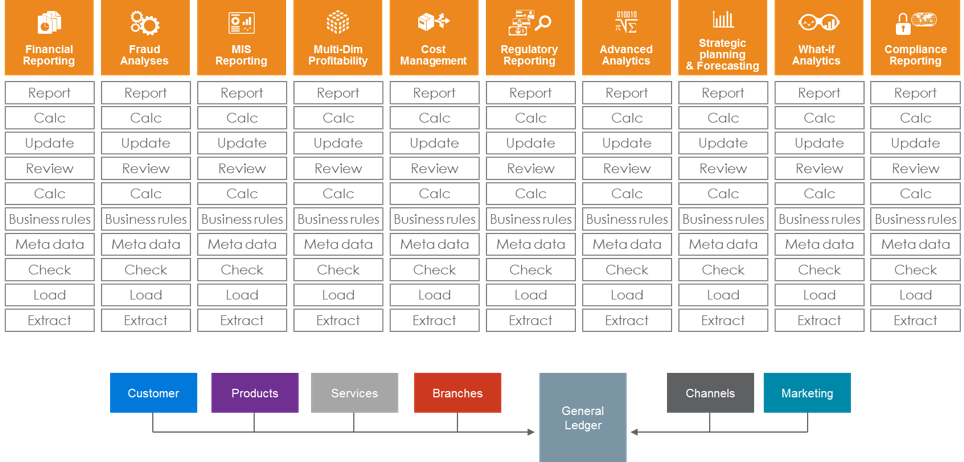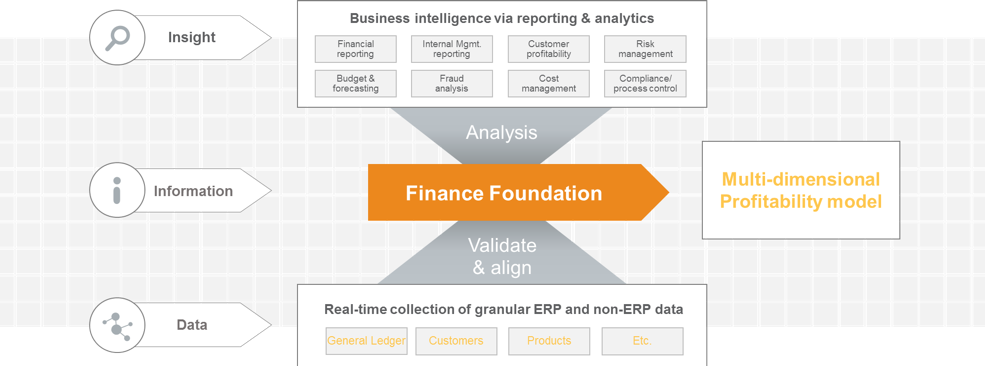If your Bank has been in “
transformation mode” for a decade or more – and talking about cost control for longer than that - you must be asking yourself, why are these projects still costing so much?
Significant sums have often been spent on establishing best practice KPIs without corresponding attention to analytic capabilities and reuse of data. Teradata’s experience suggests that there are several steps and traps in driving transformation:
- Applications are acquired to deliver profitability calculations.
- A fortune is spent on reconciliation and there are still gaps.
- There is no business case for fixing all the underlying data in one project.
- Prior big enterprise data projects failed to deliver value.
Does this sound familiar? Let’s look at each point in a bit more detail.
Buying software is an easy solution
Organizations must be able to understand the root causes of their business challenges via repeatable analyses – not only one-offs which may take months to deliver. This sort of problem is hard to solve, and software vendor promises are seductive, so most Banks have an
application driven approach to reporting and analysis:

The problem with the ‘quick fix’ of a software package is that all the white boxes above represent manual and often duplicated activities, which are repeated for every reporting and analytical activity shown in orange.
This can’t continue: new requirements drive so much additional manual work that it becomes impossible to deliver reports and analysis in a timely and efficient manner.
Reconciliation is killing progress
There is something of an obsession with reconciliation in many Banks that interferes with both execution and subsequent change.
The existing analytical architecture for Finance, such as that above, require more and more time and effort related to reconcile both horizontally and vertically to ensure compliance with regulatory requirements (e.g., BCSC239).
Teradata has deep
experience helping Banks and their Finance departments improve analytical capabilities. Our experience is that it requires a mindset change at the CFO level to get beyond an application-driven approach.
The business case for fixing data
A digital-driven Finance department must have a different view on how to make data available for reporting and analyses. The main principle is
data re-usability.
This drives a new requirement: not for massive, expensive and – frankly – boring data transformation programmes, but something more like a ‘data levy’ on each new project that allows investment in the existing underlying data foundation. It cannot be optional and dropped when project finances are overrunning.
Targeting a firm data foundation
There does, however, need to be a vision to drive this more incrementalist approach. The figure below shows what a Finance Foundation includes from a conceptual point of view.

“Data” means all relevant data at the most granular level for customer, product and activity profitability must be available approaching real-time.
“Validate & align” requires that all the activities done per “silo” is now done increasingly across all the data based on commonly defined definitions and business rules.
This is not enough: a customer (or multi-dimensional) profitability model must be defined and developed. With a multi-dimensional profitability model based on the most granular data, we now target a completely aligned data set with the following characteristics and benefits:
- All data reconciles back to source, in real time and in an automated way.
- All data transformations and reference data are defined and documented.
- The Foundation provides data for other reporting and analysis activities across Finance and Risk.
- All data is ready for any type of forward-looking activities (e.g. forecasting, modeling, what-if, etc.).
A digitally-driven Finance team holds to this vision, but pragmatically recognises that this is a journey that matches incremental value with incremental investment. No single project should be tasked with delivery of the whole.
Teradata has worked with many customers who have changed their mindsets and made progress on a data driven foundation. This experience reinforces progress which is closely aligned to the original value objective of the transformation programme – and we’d be excited to
help you to deliver success.
Without the vision that we spell out here, the next regulatory requirement will once again demand reconciliation across your silos and you’ll simply never deliver within a pragmatic budget. Forward looking CFOs are implementing this today and focused on supporting the transition to the Digital Bank of the Future – more of which we'll cover in our second blog.
(Author):
Stewart Robbins
Stewart Robbins is responsible for providing expertise within the Financial Services sector and in defining strategic data and analytics capabilities within banking, delivering business-focused support to all dimensions of projects. He brings subject matter expertise in the areas of Analytics Consulting, Data Science, Customer Insight, Predictive Modelling, and CRM in presales, solution development and delivery activities.
Stewart has extensive client-side and consulting experience in the design of analytic capabilities and delivering measurable value through data discovery and analysis. Whilst Stewart has past hands-on experience of data science, he is also an experienced leader of such teams and programmes of activity. He has helped senior business leaders develop their analytics visions with detailed supporting strategies and roadmaps.
Prior to joining Teradata, Stewart was an analytics consultant at Hewlett Packard (now DXC Technology) and spent 25 years as an analytics practitioner and leading analytics teams at E.ON Energy, Barclays Bank and Nationwide Building Society.
Stewart is a graduate of University College London with a BSc in Economics and Geography and is also an Associate of the Chartered Institute of Banking.
View all posts by Stewart Robbins
(Author):
Michael Ingemann
Michael Ingemann is the Practice Partner of CFO Analytics across Industries at Teradata EMEA. Michael has more than 30 years of experience working in the CFO space. He started out as an Auditor and then moved into Finance Director positions (Airline and Oil and Gas industries). For the past 20 years Michael, has acted as a senior advisor for many CFO’s and Finance departments across industries.
Below are samples of the projects and experiences Michael has delivered throughout his career;
- SAP and Oracle ERP implementations
- Enterprise Performance Management solutions (e.g. Financial Consolidation and Reporting, Budget & Planning and Forecasting)
- Activity Based Costing Solutions
- Customer and Product Profitability solutions
- Finance Transformation projects
Michael holds a BSc in Financial management and a Executive MBA in General mgt & business development – both obtained CBS in Copenhagen.
View all posts by Michael Ingemann